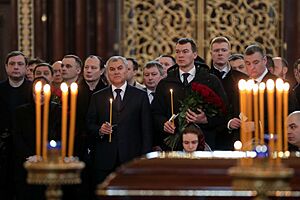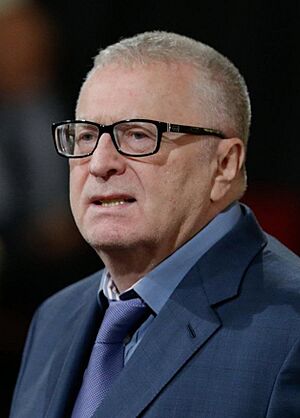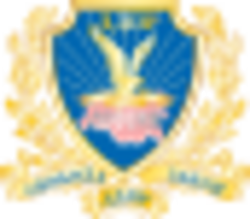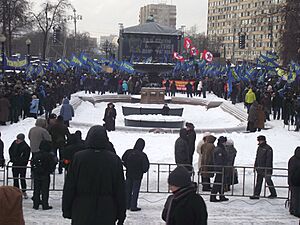Liberal Democratic Party of Russia facts for kids
Quick facts for kids
Liberal Democratic Party of Russia
Либерально-демократическая партия России
|
|
|---|---|
| Abbreviation | LDPR ЛДПР |
| Chairman | Leonid Slutsky |
| Deputy Head of the Supreme Council | Alexey Ostrovsky |
| State Duma faction leader | Leonid Slutsky |
| State Duma faction's apparatus head |
Maxim Zaytsev |
| Founder | Vladimir Zhirinovsky |
| Founded | 18 April 1992 |
| Preceded by | Liberal Democratic Party of the Soviet Union (LDPSU) |
| Headquarters | 1st Basmanny Lane, 3 building 1, Moscow |
| Newspaper | For the Russian People |
| Youth wing | Youth Organization of LDPR |
| Membership (2019) | 295,018 |
| Ideology |
|
| Political position | Right-wing to far-right |
| International affiliation | World Congress of Patriotic Parties (2003) |
| Affiliated parties | Liberal Democratic Party of Belarus Liberal Democratic Party of Transnistria |
| Colours | Yellow and blue (official) Light blue (customary) |
| Slogan | Freedom, Patriotism, Law (Russian: «Свобода, патриотизм, закон») |
| Anthem | LDPR — Velikaya Rossiya! (ЛДПР — Великая Россия!) |
| Seats in the Federation Council |
3 / 178
|
| Seats in the State Duma |
21 / 450
|
| Governors |
0 / 85
|
| Seats in the Regional Parliaments |
236 / 3,928
|
| Ministers |
1 / 31
|
| Party flag | |
 |
|
The LDPR – Liberal Democratic Party of Russia (Russian: ЛДПР – Либерально-демократическая партия России, romanized: LDPR – Liberalno-demokraticheskaya partiya Rossii) is a political party in Russia. It is known for its strong nationalistic and populist views. The party was formed in 1992, taking over from an earlier party called the Liberal Democratic Party of the Soviet Union (LDPSU).
For a long time, the party was led by Vladimir Zhirinovsky, who was its founder. He led the party until he passed away in April 2022. The LDPR has been a significant part of Russian politics. In the 1993 elections, it won almost 23% of the votes, getting 64 out of 450 seats in the State Duma, which is like Russia's parliament. In the 2021 elections, the party received 7.55% of the votes, winning 21 seats.
Even though its name includes "Liberal Democratic," some people have said the party is not truly liberal or democratic. The LDPR often focuses on strong national pride and is seen as a populist party, meaning it tries to appeal to ordinary people by offering simple solutions to complex problems. The party is generally considered loyal to the Russian government. Since May 2024, the LDPR has been part of the federal government, with Mikhail Degtyarev serving as the Minister of Sport. Members of the party are sometimes called "zhirinovets," which means "Zhirinovite" in Russian.
Contents
Party History
How the Party Started
Liberal Democratic Party of the Soviet Union
In the late 1980s, the Soviet Union began to allow more than one political party. This change was made official in October 1990. In April 1991, the Liberal Democratic Party of the Soviet Union (LDPSU) became the second political party to be officially registered in the country.
The leader of this party, Vladimir Zhirinovsky, was very good at speaking to the public. He gained 8% of the votes in the 1991 presidential elections. He also supported a coup attempt in August 1991.
Liberal Democratic Party of Russia
In 1992, the LDPSU split into different regional groups. The Liberal Democratic Party of Russia (LDPR) was then created as the main party in Russia.
The 1990s: Early Successes
In the 1993 Duma elections, the LDPR surprised many by winning 22.9% of the popular vote. This made it the party with the most votes. At that time, many Russians were unhappy with the government's reforms. Zhirinovsky was good at understanding the problems of everyday Russians and suggesting simple ways to fix them. For example, he talked about fighting crime and expanding Russia's territory.
Zhirinovsky's views were often very strong and sometimes controversial. The party's success in the early 1990s was a big surprise to many people both inside and outside Russia.
The Duma elected in 1993 was temporary. By the 1995 elections, Zhirinovsky's popularity had decreased, and his party's support was cut in half, getting 11.2% of the votes. In the 1996 presidential election, Zhirinovsky ran again but received 5.7% of the votes.
In 1999, the party ran in the elections as the "Bloc of Zhirinovsky" and received 6.0% of the votes. Zhirinovsky became a Deputy Chair of the State Duma, and his son, Igor Lebedev, led the party's group in the Duma.
The 2000s: Continued Presence
In the 2000 presidential election, Vladimir Zhirinovsky ran again and received 2.7% of the votes.
In the 2003 parliamentary elections, the party won 11.5% of the votes and gained 36 seats in the Duma. For the 2004 presidential election, the LDPR nominated Oleg Malyshkin, who received 2% of the votes.
In the 2007 legislative elections, the LDPR received 8.14% of the votes and won 40 seats in the State Duma. Zhirinovsky ran for president again in 2008 and received 9.4% of the votes.
The 2010s: Rallies and Elections
In the 2011 parliamentary elections, the party's support grew to 11.7% of the votes, giving them 56 seats. Vladimir Zhirinovsky returned to lead the LDPR group in the Duma, and his son, Igor Lebedev, became Vice Chairman of the State Duma.
Zhirinovsky ran for president again in 2012. His campaign slogan was "Vote Zhirinovsky, or things will get worse." He received 6.2% of the votes.
In the 2016 parliamentary elections, the LDPR improved its results. It became the third-largest party in the State Duma, winning 39 seats with 13.1% of the vote. This was very close to the second-placed Communist Party.
2020 to Today
In July 2020, Sergei Furgal, a popular governor from the LDPR, was arrested. This led to large protests in Khabarovsk Krai, where he was governor. President Vladimir Putin removed Furgal from his position and appointed Mikhail Degtyarev, another LDPR member, as acting governor. Some local lawmakers left the LDPR because they were unhappy with how the party handled Furgal's situation.
Zhirinovsky's Passing

In February 2022, Vladimir Zhirinovsky became very ill and was hospitalized. On April 6, 2022, Vyacheslav Volodin, the Speaker of the Duma, announced that Zhirinovsky had passed away at the age of 75.
After Zhirinovsky's death, Leonid Slutsky, who was the head of the State Duma Committee on International Affairs, was chosen as the new leader of the party.
What the Party Believes In
The LDPR wants Russia to become a powerful country again. The party does not support communism or the type of capitalism seen in the 1990s. Instead, it prefers a mixed economy where private businesses exist, but the government plays a strong role in managing things.
In terms of foreign policy, the LDPR believes in the idea of different "civilizations." It has supported the idea of Russia restoring its "natural borders," which the party believes include areas like Transcaucasia, Central Asia, Belarus, and Ukraine. The LDPR sees the United States and NATO as major threats to Russia. The party has also spoken out against how ethnic Russians are treated in the Baltic states, asking for them to be given Russian citizenship and protected.
The LDPR is against corruption and the expansion of the European Union. It supports pan-Slavism, which is the idea of unity among Slavic peoples. The party's main ideas are strong nationalism and a focus on law and order. Even though the LDPR often uses strong words against the government, it frequently votes for government proposals. This has led some to believe the party receives funding from the Kremlin. In Russia, political parties that get more than 3% of votes in elections and enter parliament receive official funding from the government.
Party Structure and Members

The party's organization was very much built around its former leader, Vladimir Zhirinovsky, until his death in April 2022.
The LDPR works with several related parties in former Soviet countries, including Armenia, Belarus, Estonia, and Ukraine. In 2003, the party stated it had 600,000 members. A survey in 2008 showed that about 4% of the Russian population supported the party.
Election Results
Presidential Elections
| Election | Candidate | First round | Second round | Result | ||
|---|---|---|---|---|---|---|
| Votes | % | Votes | % | |||
| 1991 | Vladimir Zhirinovsky | 6,211,007 | 7.81 | Lost | ||
| 1996 | 4,311,479 | 5.70 | Lost | |||
| 2000 | 2,026,513 | 2.70 | Lost | |||
| 2004 | Oleg Malyshkin | 1,405,315 | 2.02 | Lost | ||
| 2008 | Vladimir Zhirinovsky | 6,988,510 | 9.35 | Lost | ||
| 2012 | 4,458,103 | 6.22 | Lost | |||
| 2018 | 4,154,985 | 5.65 | Lost | |||
| 2024 | Leonid Slutsky | 2,795,629 | 3.24 | Lost | ||
State Duma Elections
| Election | Leader | Votes | % | Seats | +/– | Rank | Government |
|---|---|---|---|---|---|---|---|
| 1993 | Vladimir Zhirinovsky | 12,318,562 | 22.92 |
64 / 450
|
1st | Opposition | |
| 1995 | 7,737,431 | 11.18 |
51 / 450
|
Opposition (1995–98) | |||
| Coalition (1998–99) | |||||||
| Support (1999) | |||||||
| 1999 | 3,990,038 | 5.98 |
17 / 450
|
Support | |||
| 2003 | 6,944,322 | 11.45 |
36 / 450
|
Support | |||
| 2007 | 5,660,823 | 8.14 |
40 / 450
|
Support | |||
| 2011 | 7,664,570 | 11.67 |
56 / 450
|
Support | |||
| 2016 | 6,917,063 | 13.14 |
39 / 450
|
Support | |||
| 2021 | 4,252,096 | 7.55 |
21 / 450
|
Support (2021–2024) | |||
| Coalition (2024–present) |
See also
 In Spanish: Partido Liberal-Demócrata de Rusia para niños
In Spanish: Partido Liberal-Demócrata de Rusia para niños
- Liberal Democratic Party of Belarus
- Liberal Democratic Party of Transnistria
- List of Liberal Democratic Party of Russia deputies in the State Duma
 | Isaac Myers |
 | D. Hamilton Jackson |
 | A. Philip Randolph |



